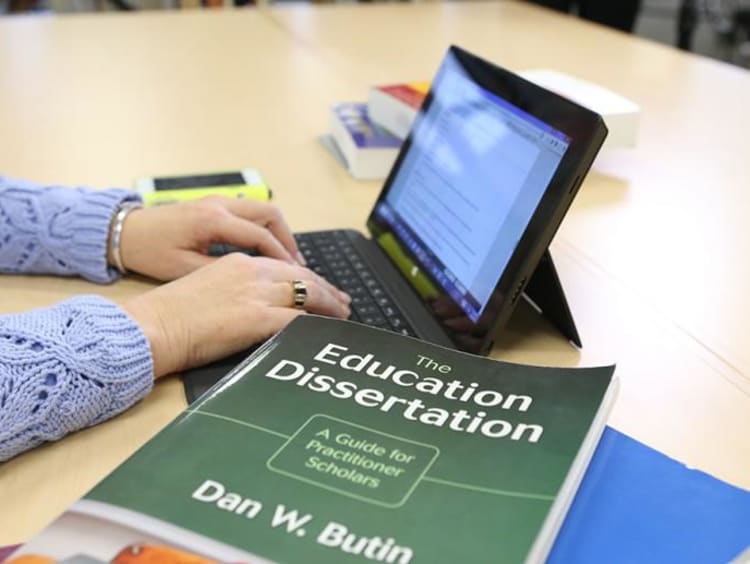The 7 “Don’ts” of Dissertation Writing – Part 1

We’re going to talk a lot about the dissertation on this blog, which should not be surprising. Writing the dissertation is the defining element of the doctoral experience, the end point of the doctoral journey.
It’s also one of the most difficult academic tasks that anyone can accomplish. Essentially, you have to write a book: a 200- to 350-page document of new original research that you yourself have created.
The College of Doctoral Studies has an innovative, embedded dissertation process that gets you started early, with great academic support in the form of rubrics, templates, milestones, etc.
But, there are still ways that things can go wrong!
Below are the first three dissertation “don’ts” that are avoidable with some good planning:
1. Don’t change topics late in the process.
Selecting the right topic for your dissertation is a very important process—so much so that it deserves its own blog post. However, once you have your topic and have started building your literature review and working on the outline of your potential research, resist the lure of changing the topic.
Some learners are sorely tempted to change over to another topic that sounds more interesting or seems easier as they work on their literature review or plan out their methodology. It is post-decisional regret, or “the grass is always greener” in action.
The truth is that all topics that are dissertation appropriate will require similar amounts of work. Always take into account how much rework you will have to do when you think about changing a topic and how much of your current literature review will be invalidated.
Unless you feel as though your current topic is completely demotivating or unworkable, don’t change.
2. Don’t start without knowing what you want to find out.
Developing and sticking to a dissertation topic is important. Your full dissertation will likely be quite complex.
However, in order for you to be successful in this complex endeavor, you need to start out simply. You need to be able to take your topic and then answer what you want to find out in one sentence: “I want to find out what happens when ______.”
If you can’t explain what you want to find out simply in one or, at most, two sentences, then you still need to do some work refining the focus of your research.
3. Don’t start until you’ve read enough.
As a doctoral scholar you will expected to read, read and read some more. All throughout the coursework, there will be textbooks, articles, journals and presentations.
One of the purposes of the dissertation is to make you an expert in a field and then have you pinpoint a gap in the existing literature and work to fill it with your own personal scholarly contribution. In order to do this, you have to read as much as the previous literature on that field as possible.
Some learners are tempted to cut this process short because they want to jump right into the research. This can be a big mistake. In the same way that a painter spends two days getting ready to paint a house and then is done painting in an hour, having read the right amount of content will make the actual research go much more quickly.
The first “don’ts” on our list are all about how to start off correctly. In a future post, we will discuss how to best manage your committee and your time while you are working away on the dissertation itself.
Get more information about succeeding in the dissertation phase and combating Parkinson’s Law by checking out our latest blog posts.
More about Dr. Berger:
Dr. Michael Berger has over a decade of experience in higher education and joined GCU in 2004. Dr. Berger participated in the teams that earned HLC accreditation for the current doctoral programs as head of curriculum design and development before moving to the College of Doctoral Studies in 2012. His dissertation focused on instructional techniques that online faculty can use to better connect with their students. He has presented at numerous regional and national conferences on the subjects of higher ed. assessment, online learning and virtual doctoral education. His bachelor’s and master’s degrees are from the University of Dayton and he received his doctorate in education from GCU. He started his doctoral program five days after his daughter was born, so he has experienced firsthand trying to simultaneously balance school, family and full-time employment.
More about Dr. Schmidt:
Dr. Wayne Schmidt attended and graduated from Concordia University in Chicago, Long Beach State University and Arizona State University earning bachelor’s, master’s and doctoral degrees from those institutions, respectively. Dr. Schmidt’s doctoral dissertation research focused on using collaborative inquiry as professional development for teachers. He has spent 36 years in the education field with those years divided into two equal halves. The first 18 were spent largely as a junior high school teacher and the second 18 as the principal of a K-8 school in the southwestern part of the U.S. Dr. Schmidt has been the founding chair of two committees in the Pacific Southwest District, the first being the District Testing Committee and the second was the District Curriculum Task Force.
Dr. Schmidt believes the ultimate goal of teaching is to make our students better people. So, whenever possible, he uses whatever the lesson of the day is to springboard into a larger lesson that, hopefully, the students can carry with them outside the classroom. In his spare time, Dr. Schmidt likes to read good mysteries, tinker with computers and play guitar. He has been fortunate enough to travel and has been to nearly all 50 states, Europe several times and Egypt.
The views and opinions expressed in this article are those of the author’s and do not necessarily reflect the official policy or position of Grand Canyon University. Any sources cited were accurate as of the publish date.


